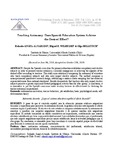Teaching autonomy: does Spanish education system achieve the desired effect?
Fecha
2020Versión
Acceso abierto / Sarbide irekia
Tipo
Artículo / Artikulua
Versión
Versión publicada / Argitaratu den bertsioa
Identificador del proyecto
Impacto
|
|
10.25115/psye.v10i1.2585 (erróneo)
Resumen
A pesar de que el currículo español para la educación primaria establece asignaturas troncales y específicas para promover la autonomía docente, la gestión curricular está logrando el efecto contrario según el profesorado. El objetivo de este estudio es comparar estadísticamente la autonomía de maestras y maestros que imparten asignaturas troncales y de quienes enseñan solo asignaturas específica ...
[++]
A pesar de que el currículo español para la educación primaria establece asignaturas troncales y específicas para promover la autonomía docente, la gestión curricular está logrando el efecto contrario según el profesorado. El objetivo de este estudio es comparar estadísticamente la autonomía de maestras y maestros que imparten asignaturas troncales y de quienes enseñan solo asignaturas específicas. El método comprende un diseño cuantitativo no experimental, estableciendo una muestra aleatoria estratificada que tiene representatividad nacional. Los resultados demuestran que el profesorado que solo imparte asignaturas específicas percibe mayor satisfacción hacia la actividad pedagógica que el otro grupo. En conclusión, es razonable poner bajo escrutinio el currículo español porque su efectividad para fomentar la autonomía docente queda cuestionada. [--]
Despite the Spanish curriculum for primary education establishes compulsory and elective subjects in order to promote teacher autonomy; curricular management is achieving the opposite of the desired effect according to teachers. This study aims statistically comparing the autonomy of educators who teach compulsory subjects and who only impart elective subjects. The method comprises a nonexperimen ...
[++]
Despite the Spanish curriculum for primary education establishes compulsory and elective subjects in order to promote teacher autonomy; curricular management is achieving the opposite of the desired effect according to teachers. This study aims statistically comparing the autonomy of educators who teach compulsory subjects and who only impart elective subjects. The method comprises a nonexperimental quantitative research design, establishing a random cluster sampling that has statistical representativeness from national standpoint. Results demonstrate that teachers who only impart elective subjects perceive a greater enjoyment toward pedagogical activity than the other group. In conclusion, it is reasonable to put the Spanish curriculum under scrutiny because its effectiveness for fostering the teacher autonomy is questioned. [--]
Materias
Motivación autónoma,
Comportamiento del profesorado,
Satisfacción laboral,
Necesidades psicológicas básicas,
Teoría de la autodeterminación,
Autonomous motivation,
Teacher behaviour,
Job satisfaction,
Basic psychological needs,
Self-determination theory
Editor
Universidad de Almería
Publicado en
Psychology, Society and Education, 2020, 12 (1), 85-96
Departamento
Universidad Pública de Navarra. Departamento de Ciencias Humanas y de la Educación /
Nafarroako Unibertsitate Publikoa. Giza eta Hezkuntza Zientziak Saila
Entidades Financiadoras
The first author expresses his gratitude to the CONICYT PFCHA/DOCTORADO BECAS CHILE/2015 for the granted doctoral scholarship. In addition, this study was supported by the I+D+i State Programme oriented towards Challenges of the Society (grant number EDU2017-84979-R).







